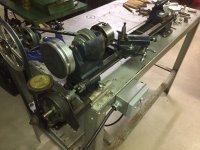projectnut
Stainless
- Joined
- Mar 4, 2006
- Location
- Wisconsin
Several years ago I was given a 1939 "Model Makers Lathe". It sat in a corner of the basement for some time in need of a little TLC. Recently I decided to bring it back to life and try to find it a good home. It's nearing the finishing stages with a few obvious exceptions, like guarding yet to be completed. I was looking at the possibility to give it to a couple of my nephews. Both show extreme interests in all things mechanical. However I believe they are way too young to be let loose with any kind of powered machinery.
Like any learning process I would think the first stage would be to watch and help "Dad" create things. Later on moving to operating the machine with vigilant adult supervision, and finally operating the machine with minimal adult supervision. At what age do you believe a child could be introduced to these types tools.
Like any learning process I would think the first stage would be to watch and help "Dad" create things. Later on moving to operating the machine with vigilant adult supervision, and finally operating the machine with minimal adult supervision. At what age do you believe a child could be introduced to these types tools.







